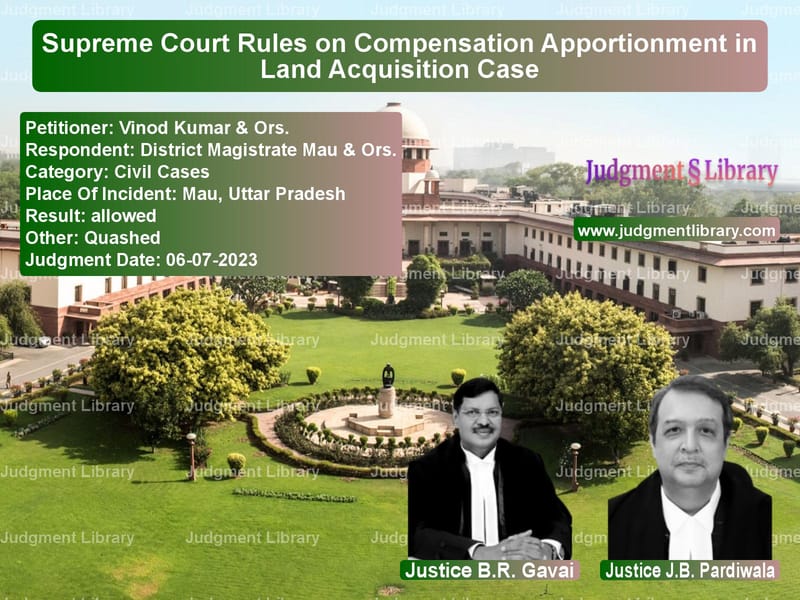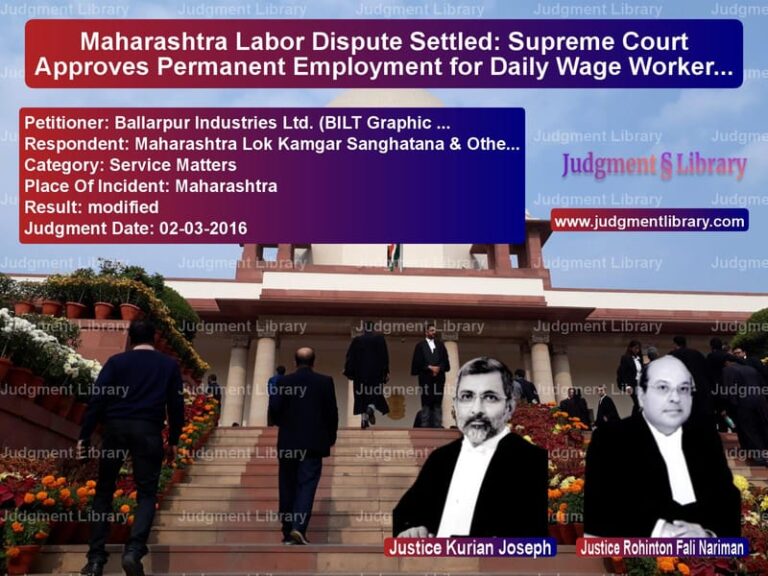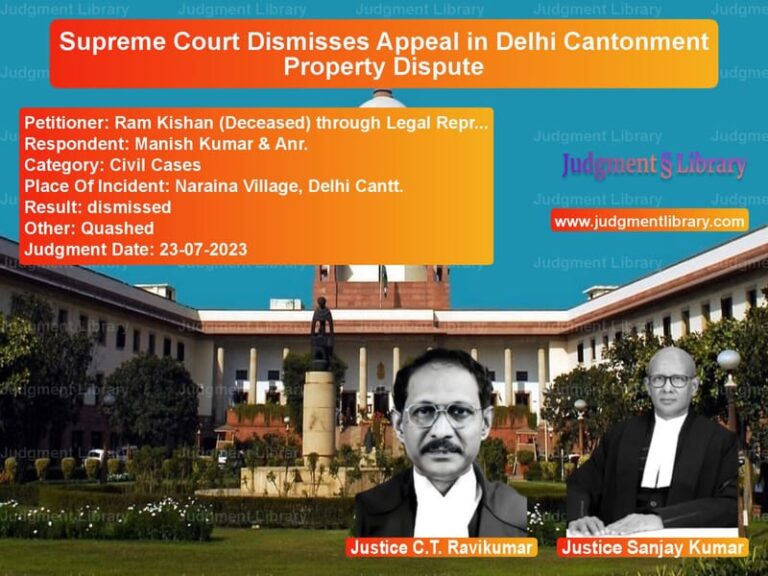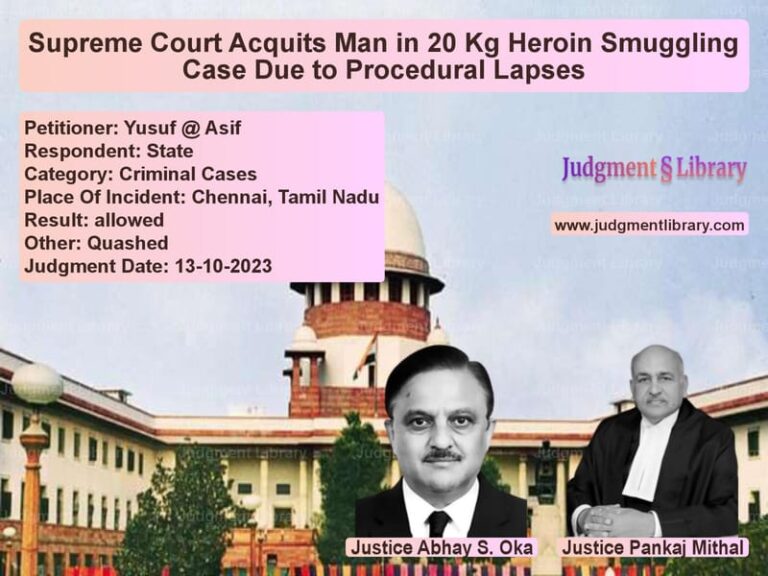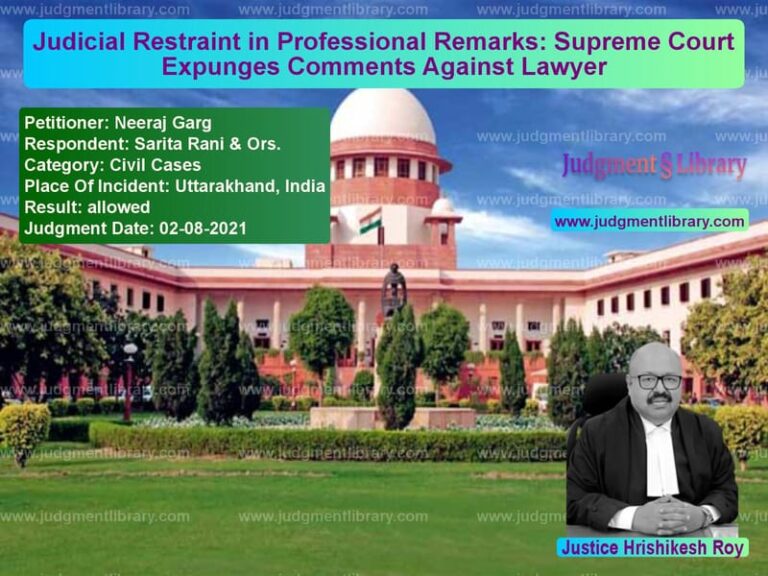Supreme Court Rules on Compensation Apportionment in Land Acquisition Case
The case of Vinod Kumar & Ors. v. District Magistrate Mau & Ors. is a landmark judgment by the Supreme Court that provides clarity on the distribution of compensation for land acquired under the National Highways Authority Act, 1956. The dispute arose when the compensation awarded for land acquisition was challenged by multiple claimants, leading to interference by the District Magistrate, which was ultimately set aside by the Supreme Court.
Background of the Case
On January 23, 2015, the Central Government issued a notification under Section 3A(1) of the National Highways Act, 1956, for acquiring land in Mau district for the expansion of National Highway No. 29. This was followed by a Section 3D notification on January 21, 2016, confirming the acquisition, thus transferring the land’s ownership to the Central Government.
The compensation assessment was conducted by the Special Land Acquisition Officer (SLAO), who apportioned the compensation among various landowners based on historical ownership records and judicial precedents. However, some claimants disputed the apportionment, leading to the intervention of the District Magistrate, who modified the SLAO’s award. This modification was upheld by the High Court, prompting the petitioners to approach the Supreme Court.
Arguments by the Petitioners
The petitioners put forth the following key arguments:
- The District Magistrate had no jurisdiction to interfere with the compensation apportionment made by the SLAO.
- Under Section 3H(4) of the National Highways Act, 1956, disputes regarding compensation distribution should be referred to a civil court.
- The District Magistrate acted in an arbitrary manner by modifying the SLAO’s order without giving the petitioners an opportunity to be heard.
- The High Court erred in its judgment by upholding the District Magistrate’s decision, thereby violating the statutory provisions of the Act.
Arguments by the Respondents
The respondents, led by the District Magistrate and other land claimants, countered the petitioners’ arguments as follows:
- The compensation apportionment required review as certain claimants were excluded despite possessing valid ownership records.
- The District Magistrate acted within his administrative authority in reviewing and correcting anomalies in the SLAO’s apportionment.
- The petitioners had not challenged the original acquisition but only the apportionment, which the respondents argued should not invalidate the District Magistrate’s decision.
- The dispute was not merely about apportionment but also about determining rightful ownership.
Key Findings of the Supreme Court
The Supreme Court thoroughly examined the legal provisions governing land acquisition, particularly focusing on Section 3H(4) of the National Highways Act, 1956. The following key observations were made:
1. Jurisdiction of the District Magistrate
“The District Magistrate does not have the power to unilaterally modify the apportionment of compensation once it has been determined by the competent authority under Section 3H.”
The Court ruled that any disputes regarding compensation must be referred to a civil court and not decided by an administrative authority.
2. Interpretation of Section 3H(4)
“Any dispute as to the apportionment of compensation must be referred to the principal civil court of original jurisdiction. The District Magistrate, acting as an executive authority, cannot override statutory provisions.”
The Court reaffirmed that judicial interpretation must be consistent with statutory provisions, and administrative interference in legal matters must be strictly curtailed.
3. The High Court’s Error
“The High Court erred in concluding that the District Magistrate had jurisdiction to modify the SLAO’s order. The judgment fails to recognize the statutory limitation on the powers of the executive in such matters.”
The Supreme Court held that the High Court’s judgment was incorrect and set it aside.
4. The Role of the Civil Court
“The dispute over ownership and apportionment of compensation is a legal issue that must be decided by a civil court through proper adjudication.”
The Court directed that the matter should be referred to the appropriate civil court.
Final Judgment
The Supreme Court allowed the appeal, stating:
“The impugned order passed by the High Court and the District Magistrate is set aside. The Special Land Acquisition Officer is directed to refer the dispute to the principal civil court of original jurisdiction for adjudication.”
This ruling reinstates the original apportionment made by the SLAO until a civil court decides otherwise.
Impact of the Judgment
This judgment has significant legal implications for land acquisition cases:
- Reinforces the statutory provisions – Ensures that disputes over land compensation are decided by courts rather than administrative bodies.
- Prevents executive overreach – Establishes a clear limitation on the powers of District Magistrates in modifying compensation awards.
- Protects landowners’ rights – Provides a legal avenue for claimants to challenge unfair compensation apportionments.
- Sets a precedent for future cases – Strengthens jurisprudence on land acquisition disputes.
Conclusion
The Supreme Court’s ruling in Vinod Kumar & Ors. v. District Magistrate Mau & Ors. reinforces the principle that compensation disputes in land acquisition matters must be settled through legal mechanisms rather than executive intervention. This judgment provides clarity on the role of the civil courts in adjudicating land disputes and ensures that statutory provisions under the National Highways Act, 1956, are strictly followed.
Petitioner Name: Vinod Kumar & Ors..Respondent Name: District Magistrate Mau & Ors..Judgment By: Justice B.R. Gavai, Justice J.B. Pardiwala.Place Of Incident: Mau, Uttar Pradesh.Judgment Date: 06-07-2023.
Don’t miss out on the full details! Download the complete judgment in PDF format below and gain valuable insights instantly!
Download Judgment: vinod-kumar-&-ors.-vs-district-magistrate-supreme-court-of-india-judgment-dated-06-07-2023.pdf
Directly Download Judgment: Directly download this Judgment
See all petitions in Property Disputes
See all petitions in Landlord-Tenant Disputes
See all petitions in Damages and Compensation
See all petitions in Judgment by B R Gavai
See all petitions in Judgment by J.B. Pardiwala
See all petitions in allowed
See all petitions in Quashed
See all petitions in supreme court of India judgments July 2023
See all petitions in 2023 judgments
See all posts in Civil Cases Category
See all allowed petitions in Civil Cases Category
See all Dismissed petitions in Civil Cases Category
See all partially allowed petitions in Civil Cases Category

